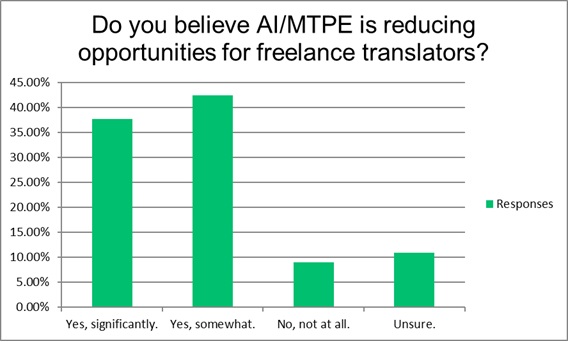AI & MTPE in the Translation Industry
As artificial intelligence (AI) continues to reshape industries, the translation sector is undergoing a profound transformation. Machine Translation Post-Editing (MTPE) has become an integral part of workflows for many translators, raising key questions about quality, pricing, and future opportunities. To better understand how professionals are adapting, GTS Translation conducted a survey of freelance translators to gain insights into MTPE adoption, pricing expectations, and industry sentiment.
The survey questions were sent to 3,300 professional freelance translators across various languages and countries. 212 responses were received. The margin of error for this survey, given the population size and responses, is approximately 6.68%.
The results reveal a clear picture of an industry in transition—where automation is increasing, but human expertise remains critical.
Survey Methodology and Key Data Points
GTS surveyed 212 freelance translators to analyze:
- MTPE adoption rates
- Impact of AI/MTPE on pricing and translator earnings
- Discounts offerred for PEMT work
- Quality perception of MTPE-generated translations
- Future outlook on AI-driven workflows
The results highlight major shifts in how translators work and perceive AI’s growing influence in the industry.
MTPE Adoption: How Many Translators Use It?
Survey Data:
- 47.83% work on MTPE frequently, and 40.10% occasionally—a total of 87.93% adoption.
- Only 12.08% have never worked on MTPE.
Analysis: MTPE is no longer a niche process; it is now a dominant workflow. The majority of freelance translators engage with MTPE regularly, suggesting that clients and agencies now expect translators to be comfortable with post-editing machine output.
Impact of AI/MTPE on Pricing & Client Expectations
Survey Data:
- 48.79% say AI/MTPE has significantly influenced pricing expectations.
- 37.20% say it has somewhat influenced pricing.
- Only 14.01% believe pricing has remained unaffected.
Analysis: A growing number of clients now expect lower rates for MTPE projects, placing downward pressure on freelance translator earnings. Many agencies are offering tiered pricing models, where human-only translation commands a premium over MTPE. However, translators who specialize in high-value fields such as legal or medical translation report better resilience against pricing pressures.
Bottom line: the translation prices per word that translation companies and freelance translators are charging have dropped.
Discounting MTPE Projects: Do Translators Lower Their Rates?
Survey Data:
- A significant portion (around 50%) of respondents do not offer discounts for MTPE work, arguing that post-editing can take as much time as traditional translation.
- Among those who do offer discounts, the most common range is between 10-30%.
- Some translators report discounting by up to 50%, while a few mention adjusting pricing based on the quality of machine translation output.
Analysis: Many translators resist discounting MTPE rates, citing that the effort required for post-editing is often underestimated. Others accept lower rates but compensate by negotiating higher hourly rates or per-word fees based on complexity. Agencies and clients who push for discounts are driving industry-wide pricing pressures, leading some translators to explore alternative pricing models (such as hourly rates or tiered pricing).
Quality of Machine Translation: Are Translators Satisfied?
Survey Data:
- 12.08% say MTPE produces high-quality output.
- 66.18% say MTPE output is “acceptable but requires significant edits.”
- 21.74% say MTPE output is poor and requires extensive rework.
Analysis: Despite advancements in AI, translators remain skeptical about MTPE quality. The majority (66.18%) acknowledge that MTPE can be useful but still requires substantial human intervention. This reinforces the view that MTPE is not a replacement for human translation but a tool requiring skilled oversight.
Will MTPE Dominate the Translation Industry?
Survey Data:
- 38.65% believe MTPE will “very likely” dominate the industry.
- 43.96% say MTPE will “play a major role, but not entirely take over.”
- Only 6.76% believe MTPE will not dominate.
- 10.63% are unsure about MTPE’s dominance.
Analysis: While MTPE is expected to remain a major component of the industry, many translators believe that it will not fully replace human translation, especially in specialized fields. The consensus is that MTPE is best suited for technical and repetitive content but struggles with creative, legal, and nuanced translations.
The Freelancer Perspective: Is AI Reducing Opportunities?
Survey Data:
- 37.20% say AI/MTPE is significantly reducing opportunities.
- 42.51% say it has some impact.
- Only 9.18% believe it has had no effect on their job prospects.
- 11.11% are unsure.
Analysis: While concerns about job losses persist, freelancers are finding ways to adapt by specializing in post-editing, quality assurance, and AI-assisted workflows. Some are diversifying their services by offering consulting on AI translation workflows and training clients on best practices for MTPE.
Conclusion: The Future of MTPE & AI in Translation
- AI and MTPE are now mainstream, with nearly 90% of translators involved in post-editing.
- Pricing pressure is real, but opportunities still exist for specialized linguists.
- MTPE is not replacing human translators, but it’s changing the way they work.
- The next evolution? Translators mastering AI tools, editing workflows, and offering premium services.
As AI continues to evolve, the challenge for translators is clear: adapt to new workflows, refine post-editing skills, and find ways to add value beyond what machines can achieve.
The Raw Data
Here are the full data set of our MTPE survey.
| Have you worked on projects involving Machine Translation Post-Editing (MTPE)? | ||
| Answer Choices | Responses | |
| Yes, frequently. | 49.06% | 104 |
| Yes, occasionally. | 39.15% | 83 |
| No, never. | 11.79% | 25 |
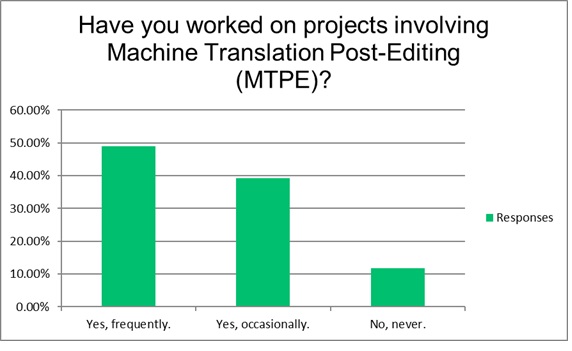
| What percentage of your projects involve MTPE workflows? | ||
| Answer Choices | Responses | |
| Less than 25% | 31.60% | 67 |
| 25–50% | 35.38% | 75 |
| 50–75% | 21.70% | 46 |
| More than 75% | 11.32% | 24 |
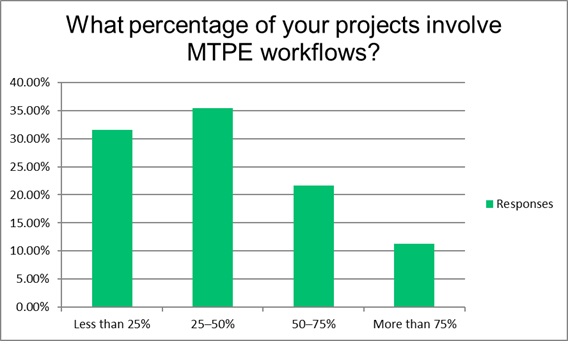
| Over the past two years, how has your involvement in Machine Translation Post-Editing (MTPE) projects changed? | ||
| Answer Choices | Responses | |
| Increased significantly (MTPE now constitutes the majority of my work). | 30.19% | 64 |
| Increased moderately (MTPE projects are more frequent but not the majority). | 46.23% | 98 |
| Stayed about the same (no noticeable change in MTPE involvement). | 11.79% | 25 |
| I have never worked on MTPE projects. | 11.79% | 25 |
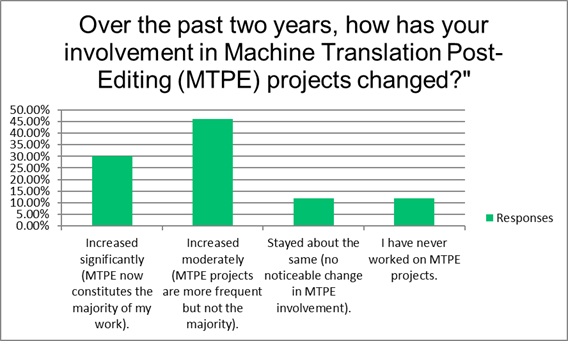
| Do you feel that AI/MTPE is influencing client expectations regarding pricing? | ||
| Answer Choices | Responses | |
| Yes, significantly. | 49.06% | 104 |
| Yes, somewhat. | 37.26% | 79 |
| No, not at all. | 13.68% | 29 |
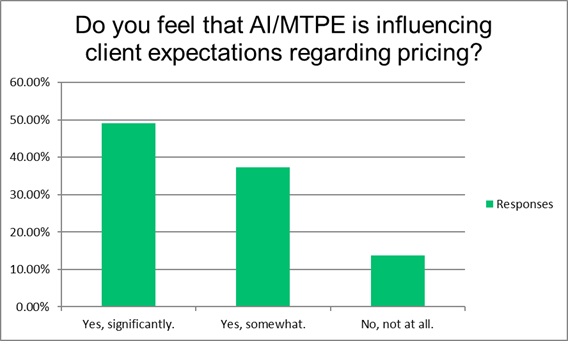
| If you have worked with MTPE, how do you feel about the quality of machine-generated translations? | ||
| Answer Choices | Responses | |
| Usually high quality. | 12.74% | 27 |
| Acceptable quality but requires significant edits. | 66.04% | 140 |
| Poor quality and requires extensive rework. | 21.23% | 45 |
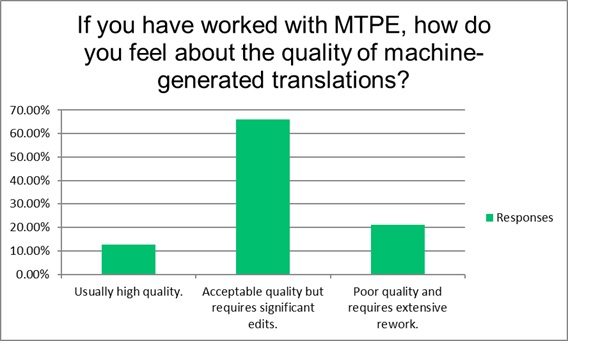
| Do you think MTPE will eventually dominate the industry? | ||
| Answer Choices | Responses | |
| Yes, very likely. | 38.68% | 82 |
| Possibly, but not entirely. | 43.87% | 93 |
| No, unlikely. | 7.08% | 15 |
| Unsure. | 10.38% | 22 |
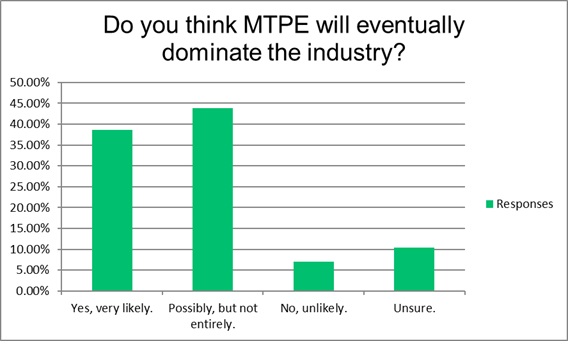
| Do you believe AI/MTPE is reducing opportunities for freelance translators? | ||
| Answer Choices | Responses | |
| Yes, significantly. | 37.74% | 80 |
| Yes, somewhat. | 42.45% | 90 |
| No, not at all. | 8.96% | 19 |
| Unsure. | 10.85% | 23 |
